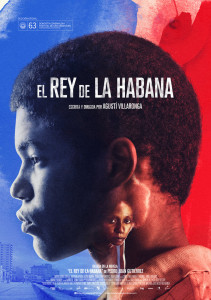WITH “THE KING OF HAVANA” THE ICAIC CONDEMNS QUALIFYING CUBA AS “THE BROTHEL OF EUROPA”.
The state Cuban Film Institute (ICAIC) called it “an unforgivable insult” the Spanish director Agusti Villaronga has affirmed that Cuba is “the brothel of Europe” and considered that his film “The King of Havana” is a “show morbid exploiting the pain of others. ”
“In an interview he says the director believes that Cuba is the brothel of Europe. If true this statement would be an unforgivable offense, “said the president of ICAIC, Robert Smith, in an article published on the website of the Institute (www.cubacine.cultu.cu).
In an interview with the (“Pan black”) Spanish daily El Mundo, Villaronga declared that “Cuba has become the brothel of Europe,” prostitution “is a form of survival” on the island and that the film does not There was “nothing like the Cuban government”.
In the film adaptation of the novel by Cuban writer Pedro Juan Gutierrez, Villaronga sharply portrays the environment of hardship, violence and prostitution in Cuba 90, plunged into the deep economic crisis that led to the disintegration of the Soviet Union, mainstay of the island for three decades.
Shot in Dominican Republic with Cuban actors, the film won the Silver Shell for Best Actress for Yordanka Ariosa in the last edition of the Festival of San Sebastian.
https://youtu.be/gScQoKVv48M
FILM “THE KING OF HAVANA” TRAILER .
Smith considered “legitimate” Villaronga intended to address the “ends” of a reality, but stressed that “confuse the margins of society as a whole is not honest.”
It also recognized that the ICAIC told the filmmaker that his project shooting the film in Cuba “was not possible, nor interested the producer” Cuban, but denied that he was censored on the island.
“A range of media statements and criticism, the government will decide whether the film is an artistic exploration of the ‘voiceless’ or a morbid spectacle that exploits the pain of others,” Smith said.
Agencies / MartiNews / YouTube / InternetPhotos / TheCubanHistory.com
The Cuban History, Hollywood.
Arnoldo Varona, Editor.
CON “EL REY DE LA HABANA” EL ICAIC CONDENA EL CALIFICAR A CUBA COMO “EL BURDEL DE EUROPA”.
El estatal Instituto Cubano de Cine (ICAIC) calificó como “una ofensa imperdonable” que el cineasta español Agustí Villaronga haya afirmado que Cuba es “el burdel de Europa”, y consideró que su filme “El rey de La Habana” es un “espectáculo morboso que explota el dolor ajeno”.
“En una entrevista se dice que el director considera que Cuba es el burdel de Europa. De ser cierta esta declaración se trataría de una ofensa imperdonable”, señaló el presidente del ICAIC, Roberto Smith, en un artículo publicado en el sitio web del Instituto (www.cubacine.cultu.cu).
En una entrevista con el diario español El Mundo, Villaronga (“Pan negro”) declaró que “Cuba se ha convertido en el burdel de Europa”, que la prostitución “es una forma de supervivencia” en la isla y que su película no le había “gustado nada al gobierno cubano”.
En el filme, adaptación de la novela homónima del escritor cubano Pedro Juan Gutiérrez, Villaronga retrata con dureza el ambiente de penurias, violencia y prostitución en la Cuba de los 90, sumida en la profunda crisis económica que generó la desintegración de la Unión Soviética, principal sostén de la isla durante tres décadas.
Rodada en República Dominicana con actores cubanos, la película ganó la Concha de Plata a la mejor actriz para Yordanka Ariosa en la pasada edición del Festival de San Sebastián.
https://youtu.be/gScQoKVv48M
PELICULA “EL REY DE LA HABANA” AVANCES.
Smith consideró “legítima” la intención de Villaronga de abordar los “extremos” de una realidad, pero destacó que “confundir los márgenes con la sociedad en su conjunto no es honesto”.
Asimismo, reconoció que el ICAIC comunicó al cineasta que su proyecto de rodar el filme en Cuba “no era posible, ni interesaba a la productora” cubana, pero negó que esté censurado en la isla.
“A margen de los medios, de las declaraciones y las críticas, serán los públicos los que decidan si el filme es una exploración artística de los ‘sin voz’ o un espectáculo morboso que explota el dolor ajeno”, dijo Smith.
Agencies/MartiNews/YouTube/InternetPhotos/TheCubanHistory.com
The Cuban History, Hollywood.
Arnoldo Varona, Editor.




